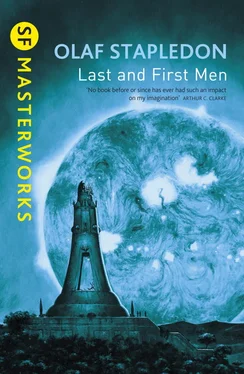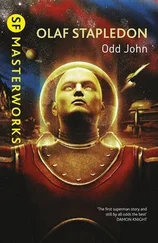“Fools!” he cried. “Senile infants! If God really likes your adulation, and all this hugger-mugger, it is because he enjoys the joke against you, and against himself, too. You are too serious, yet not serious enough; too solemn, and all for puerile ends. You are so eager for life, that you cannot live. You cherish your youth so much that it flies from you. When I was a boy, I said, ‘Let us keep young’; and you applauded, and went about hugging your toys and refusing to grow up. What I said was not bad for a boy, but it was not enough. Now I am a man; and I say, ‘For God’s sake, grow up!’ Of course we must keep young; but it is useless to keep young if we do not also grow up, and never stop growing up. To keep young, surely, is just to keep supple and keen; and to grow up is not at all a mere sinking into stiffness and into disillusion, but a rising into ever finer skill in all the actions of the game of living. There is something else, too, which is a part of growing up — to see that life is really, after all, a game; a terribly serious game, no doubt, but none the less a game. When we play a game, as it should be played, we strain every muscle to win; but all the while we care less for winning than for the game. And we play the better for it. When barbarians play against a Patagonian team, they forget that it is a game, and go mad for victory. And then how we despise them! If they find themselves losing, they turn savage; if winning, blatant. Either way, the game is murdered, and they cannot see that they are slaughtering a lovely thing. How they pester and curse the umpire, too! I have done that myself, of course, before now; not in games but in life. I have actually cursed the umpire of life. Better so, anyhow, than to insult him with presents, in the hope of being favoured; which is what you are doing here, with your salaams and your vows. I never did that. I merely hated him. Then later I learned to laugh at him, or rather at the thing you set up in his place. But now at last I see him clearly, and laugh with him, at myself, for having missed the spirit of the game. But as for you! Coming here to fawn and whine and cadge favours of the umpire!”
At this point the people rushed toward him to seize him. But he checked them with a young laugh that made them love while they hated. He spoke again.
“I want to tell you how I came to learn my lesson. I have a queer love for clambering about the high mountains; and once when I was up among the snow-fields and precipices of Aconcagua, I was caught in a blizzard. Perhaps some of you may know what storms can be like in the mountains. The air became a hurtling flood of snow. I was swallowed up and carried away. After many hours of floundering, I fell into a snow-drift. I tried to rise, but fell again and again, till my head was buried. The thought of death enraged me, for there was still so much that I wanted to do. I struggled frantically, vainly. Then suddenly — how can I put it? — I saw the game that I was losing, and it was good. Good, no less to lose than to win. For it was the game, now, not victory, that mattered. Hitherto I had been blindfold, and a slave to victory; suddenly I was free, and with sight. For now I saw myself, and all of us, through the eyes of the umpire. It was as though a play-actor were to see the whole play, with his own part in it, through the author’s eyes, from the auditorium. Here was I, acting the part of a rather fine man who had come to grief through his own carelessness before his work was done. For me, a character in the play, the situation was hideous; yet for me, the spectator, it had become excellent, within a wider excellence. I saw that it was equally so with all of us, and with all the worlds. For I seemed to see a thousand worlds taking part with us in the great show. And I saw everything through the calm eyes, the exultant, almost derisive, yet not unkindly, eyes of the playwright.
“Well, it had seemed that my exit had come; but no, there was still a cue for me. Somehow I was so strengthened by this new view of things that I struggled out of the snow-drift. And here I am once more. But I am a new man. My spirit is free. While I was a boy, I said, ‘Grow more alive’; but in those days I never guessed that there was an aliveness far intenser than youth’s flicker, a kind of still incandescence. Is there no one here who knows what I mean? No one who at least desires this keener living? The first step is to outgrow this adulation of life itself, and this cadging obsequiousness toward Power. Come! Put it away! Break the ridiculous image in your hearts, as I now smash this idol.”
So saying he picked up a great candlestick and shattered the image. Once more there was an uproar, and the temple authorities had him arrested. Not long afterwards he was tried for sacrilege and executed. For this final extravagance was but the climax of many indiscretions, and those in power were glad to have so obvious a pretext for extinguishing this brilliant but dangerous lunatic.
But the cult of the Divine Boy had already become very popular, for the earlier teaching of the prophet expressed the fundamental craving of the Patagonians. Even his last and perplexing message was accepted by his followers, though without real understanding. Emphasis was laid upon the act of iconoclasm, rather than upon the spirit of his exhortation.
Century by century, the new religion, for such it was, spread over the civilized world. And the race seemed to have been spiritually rejuvenated to some extent by widespread fervour. Physically also a certain rejuvenation took place; for before his death this unique biological “sport,” or throw-back to an earlier vitality, produced some thousands of sons and daughters; and they in turn propagated the good seed far and wide. Undoubtedly it was this new strain that brought about the golden age of Patagonia, greatly improving the material conditions of the race, carrying civilization into the northern continents and attacking problems of science and philosophy with renewed ardour.
But the revival was not permanent. The descendants of the prophet prided themselves too much on violent living. Physically, sexually, mentally, they over-reached themselves and became enfeebled. Moreover, little by little the potent strain was diluted and overwhelmed by intercourse with the greater volume of the innately “senile”; so that, after a few centuries, the race returned to its middleaged mood. At the same time the vision of the Divine Boy was gradually distorted. At first it had been youth’s ideal of what youth should be, a pattern woven of fanatical loyalty, irresponsible gaiety, comradeship, physical gusto, and not a little pure devilry. But insensibly it became a pattern of that which was expected of youth by sad maturity. The violent young hero was sentimentalized into the senior’s vision of childhood, naďve and docile. All that had been violent was forgotten; and what was left became a whimsical and appealing stimulus to the parental impulses. At the same time this phantom was credited with all the sobriety and caution which are so easily appreciated by the middleaged.
Inevitably this distorted image of youth became an incubus upon the actual young men and women of the race. It was held up as the model social virtue; but it was a model to which they could never conform without doing violence to their best nature, since it was not any longer an expression of youth at all. Just as, in an earlier age, women had been idealized and at the same time hobbled, so now, youth.
Some few, indeed, throughout the history of Patagonia, attained a clearer vision of the prophet. Fewer still were able to enter into the spirit of his final message, in which his enduring youthfulness raised him to a maturity alien to Patagonia. For the tragedy of this people was not so much their “senescence” as their arrested growth. Feeling themselves old, they yearned to be young again. But, through fixed immaturity of mind, they could never recognize that the true, though unlooked-for, fulfilment of youth’s passionate craving is not the mere achievement of the ends of youth itself, but an advance into a more awake and far-seeing vitality.
Читать дальше











